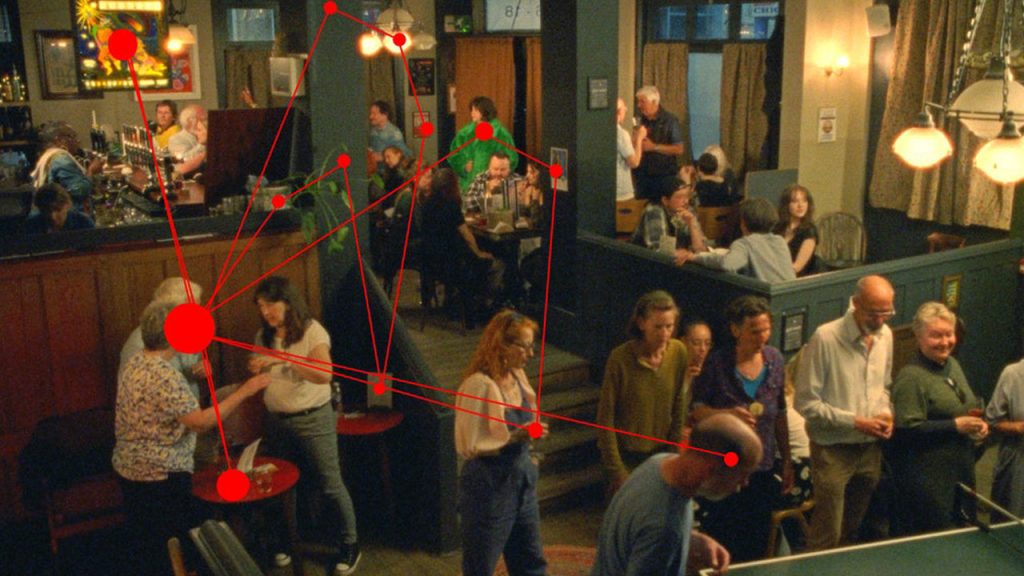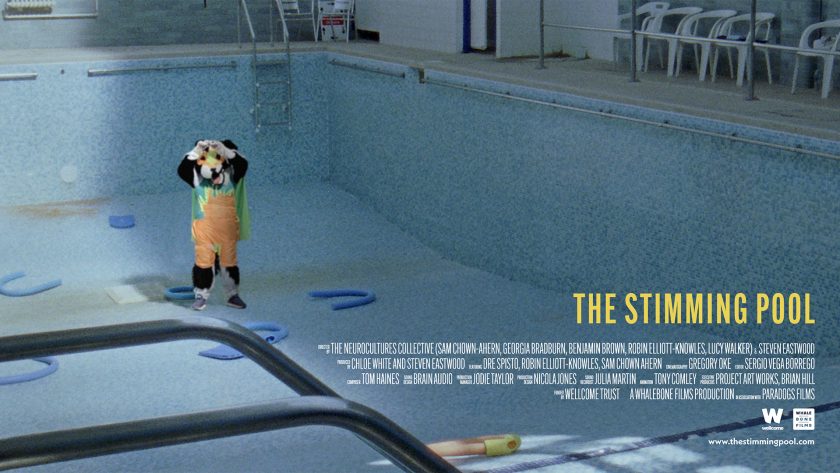Storytelling often finds itself on that straight and narrow path which begins with a beginning and ends with an end. The Stimming Pool (2024), however, invites us to run through its corridors, to stray far from ‘the norm’ and leave baffled by it. The docu-fiction nests several, neurodiverse perspectives within one another, navigating society in the search for a space empty of its norms.
This year’s London Film Festival (LFF) also departs from paths well-trodden, as its ‘Create’ strand marks the first screening of The Stimming Pool alongside non-documentary work. A directorial collaboration between Steven Eastwood and the Neurocultures Collective (Sam Chown Ahern, Georgia Bradburn, Benjamin Brown, Robin Elliott-Knowles & Lucy Walker), ‘Create’ showcases the ‘electricity of the creative process’ and, ahead of their UK premiere this Friday 11 October, I spoke to Georgia and Steven about the process behind their genre-blending feature.
It is not often that you see six names under a ‘directed by’ credit, especially in an industry whose awards season is largely upheld by an anticipation for the one, ‘best’ director of the year. Over the two Covid years spent preparing The Stimming Pool, it became clear to Georgia that wherever the project was going it would not be dictated by a one, linear narrative.
The Neurocultures Collective, Georgia explains, “is made up of five different backgrounds and art disciplines” which ensure “things flow in and out of each other illogically,” she then pauses to amend, “or rather, in a non-linear way which is the autistic, neurodivergent and creative way.” The Stimming Pool fittingly resists being pigeon-holed into any one genre, “everything about the way we made the film is non-traditional,” she explains. Through an intuitive camera, many easter-eggs tucked behind each frame and a lack of any explanatory, chapter headings, we watch the line between fiction and documentary become refreshingly blurry. Experimentation, however, is not always welcome by the “budget and funders” who, Georgia explains, “restrict [the film] more to documentary, but we knew we didn’t want to follow a bunch of talking heads.”

Rather than point at the neurodiverse experience with laser precision, as one scene at the GP simulates, The Stimming Pool makes space for both the medium and matter in a rich but lightly worn 67 minutes. By “challenging the notion of documentary as truth,” Georgia cryptically summises how “this is a very truthful film but not in the sense of everything you see is real”. I sense Chess, the canine mascot of the feature, could appear in a cloud of dust at any moment.
The term ‘magical realism’ may cause pages of a Rushdie novel or scenes of an Iñárritu epic to flicker behind the retinas. Or, if less fortunate, the related academic jargon, and its staunch rejection of anything magic-adjacent, may be what you associate the genre with. Either way, documentary, usually, is not what comes to mind. For Steven and the Collective, magical realism was a core, shared interest which shines through the embedded ‘mini-novellas’ of the film. Binaries between fiction and documentary are not so much resisted as completely dissolved, “the discussion of ‘what is documentary?’ didn’t really matter to us. We just wanted to make something that represented how our brains worked as autistic artists,” explains Georgia. Doing away with definitions allows The Stimming Pool to honour its motivations as a maze of detailed and playful self-reference.
As students, for three or four years it is our main occupation to find and lose ourselves in the maze of academia. As creatives, we risk getting caught in all the theory. Steven, also a professor of Languages, Linguistics and Film at ‘Queen Mary University of London’, had the below advice for student filmmakers hesitant to experiment,
“I think people often privilege the script as the bible of the project. With this [film], everyone was much more interested in the process than in the product. Every film is painful to make. Good advice is to find as much time as you can to swim around in your ideas rather than converting them into structures, which happens too often with early career filmmakers who use those structures because they think they work. You just end up with derivatives of stuff. We spent a lot of time processing the forms and the themes like … what’s it like to flow through a crowd?”
“That element of play was so important,” Georgia agrees, “films I worked on before felt like everything was so serious, you only had a certain time to dream then its script, pre-production etc.” What is cinema if not the ‘adultification’ of our innate instinct to dream up and make-believe? Time and process, two words us student filmmakers should not confuse with deadlines and method, are the core of The Stimming Pool’s creative process. A film which merits re-watching as many times as one re-reads a “Where’s Wally” – another shared interest among the directorial team.

In FilmSoc Journal tradition, we also asked what aftertaste Georgia and Steven would leave a screening of The Stimming Pool with. A deconstructed sandwich and trifle respectively. See their thorough culinary justification over on our Instagram @uclfilmsociety.
Watch the trailer for The Stimming Pool, UK Premiere LFF Friday 11 October 2024




